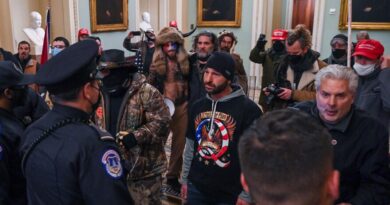One of QAnon’s most widely quoted critics reveals his real name. Hint: It’s not Travis View.

Driving this change was an increasingly popular podcast reaching more than 100,000 listeners and earning more than $60,000 a month. A related live stream on Twitch, which is where he publicly revealed his real name for the first time on Thursday, only added to that audience — and profit — for Strain and the show’s other two co-hosts.
But Strain’s use of a professional pseudonym has complicated this success story.
The Washington Post, which like other news organizations quoted him several times offering analysis of QAnon, was not aware that the Travis View persona was an invention, created for the anything-goes world of the Internet in 2017. Strain also used the name in real-world events, including for a panel discussion on online radicalization hosted by the Atlantic Council, a Washington think tank, in February, and a separate event for the group in 2019.
Strain acknowledged that he did not consistently tell reporters and others interested in tapping his knowledge of QAnon that Travis View was invented, though an Atlantic Council official said he was aware of the pseudonym. Strain said he used the name to freely comment on QAnon — whose followers are known for harassing critics and journalists — without risking possible repercussions, including at work.
“I guess this is part of Internet culture,” he said in an interview with The Post. “It was always assumed that if you were commenting on the Internet, your handle was not your real name.”
When The Post learned that Travis View was not his real name, through a comment he made during an HBO documentary on QAnon that aired in March, it asked him about the issue and prepared to add clarifications to stories that had quoted him. (The Post allows the use of pseudonyms only in extremely rare situations, usually regarding safety concerns. The Post alerts readers when pseudonyms are used.)
Experts in journalistic ethics said Strain’s use of a pseudonym created complex ethical issues for the news organizations that quoted him.
Pseudonyms are not unusual in coverage of literature, the arts and entertainment. Rapper and actor Ice Cube, for example, was born O’Shea Jackson. Filmmaker Woody Allen was Allan Stewart Konigsberg. Judy Garland was Frances Ethel Gumm.
But news organizations have a duty to be clear with their readers, experts said, while also using authentic identifiers of subjects and sources to hold them accountable for their representations in news articles. Experts also said news organizations sometimes have legitimate reasons for using pseudonyms — to protect the safety of subjects or their families, for example — but it’s hard to assess such issues if they are unaware that a commentator in a story is using a fake name.
“They didn’t give these news outlets a chance to engage this ethical reasoning, and I think that’s a problem,” said Kathleen Bartzen Culver, director of the Center for Journalism Ethics at the University of Wisconsin. “But I can see how this person thought it was not a problem” because such journalistic standards are not widely understood by the public.
The rise of Internet culture, with its widespread use of anonymity and a variety of alternative naming conventions, has forced news organizations to rethink their policies without misleading readers, said Susan McGregor, a former Wall Street Journal data journalist and now a researcher for Columbia University’s Data Science Institute specializing in journalist security.
“This is totally normal for the Internet. It’s not surprising at all that he didn’t want to do this under his real name,” McGregor said.
Travis View was created in 2017 as a Twitter account that Strain said he used to comment on politics and culture at a time when he was working for a digital marketing firm that might not have welcomed the publicity created by a vocal employee. Travis was a cousin’s name, Strain said. View was taken from a feature on an analytics portal that allowed marketers to monitor online traffic.
QAnon itself was born the same year, in anonymous postings on Internet chat room 4chan featuring baseless claims that Democratic leaders were satanic pedophiles and that Donald Trump was leading a war against an entrenched “deep state” that protected the criminals. The ideology emerged as a major force online in 2018, right as Strain was extending his online commentary to include disinformation.
A tweet in July that year by Charlie Kirk, the head of conservative youth activist group Turning Point USA, drew Strain’s attention because it cited statistics about human trafficking arrests that supposedly were from the Justice Department. Strain traced them to a previous QAnon post and tweeted about his discovery. Kirk ultimately removed the post, Strain said.
“Here’s this absolutely bizarre, off-the-wall belief system being promoted by mainstream conservatives,” Strain said in the interview. “That struck me as just wrong.”
Kirk’s spokesman, Adam Kolvet, declined to comment.
Strain started getting calls from journalists soon after. He also appeared in 2019 at a conference in Washington hosted by the Atlantic Council. He told Atlantic Council staff his real name, which they used to book flights and a hotel room for him.
Graham Brookie, director of the think tank’s Digital Forensics Research Lab, which studies disinformation, said he knew that Travis View was a pseudonym and was not troubled by its use given that the man’s views appeared to be given truthfully and that researchers into QAnon often have been harassed online.
“When he has joined us for public events, we confirmed his credentials and respected his use of a pseudonym,” Brookie said. “The work of understanding conspiracy communities, especially communities increasingly radicalized online, comes with personal risk. … Some researchers, particularly those working independently and without the resources and security offered in a professional setting, choose to work using pseudonyms in order to do the work at all.”
Strain’s public profile as a QAnon expert — or rather that of Travis View — continued to grow as the extremist ideology became a major international news story in 2020, with themes routinely cross-pollinating with those voiced by the president and his supporters.
On Jan. 11, less than a week after a mob of Trump supporters — many of them displaying QAnon slogans or symbols — stormed the Capitol, Twitter offered the Travis View account a coveted “blue check” badge of authenticity.
Twitter rules permit the use of pseudonyms, even for verified accounts, as long as the online identity is consistent, Twitter spokeswoman Katie Rosborough said. The Travis View account links to the QAnon Anonymous podcast and contains other factual information.
The HBO documentary, in which Strain hinted that Travis View is not his real name, caught the attention of other researchers. Called about the issue by The Post, Strain decided it was time make his identity clear — a decision made easier, he said, after he left his longtime employer in November to become a full-time podcaster. He plans to keep using the name Travis View on the podcast and in other professional settings.
“My existence kind of burst into the real world along with QAnon,” Strain said in the interview in which he acknowledged his real name — a public step that also prompted similar revelations on QAnon Anonymous.
“I’m glad I got it over with,” Strain said.
Julie Tate contributed to this article.
*** This article has been archived for your research. The original version from The Washington Post can be found here ***

